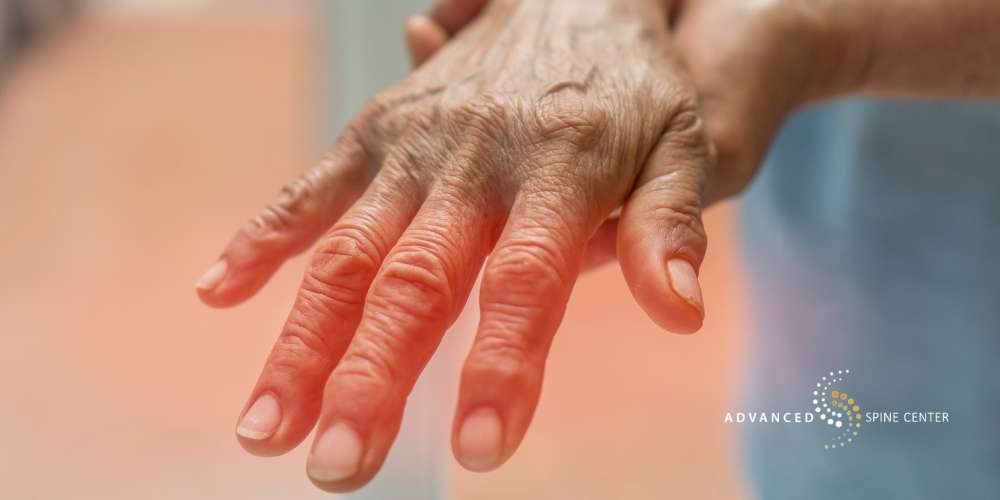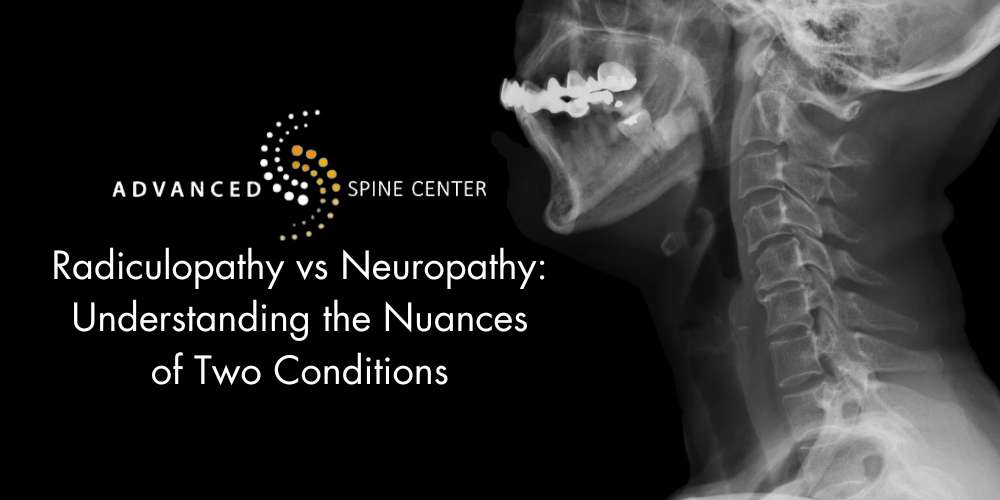Table of Contents
There are a number of different nerve-related conditions that can result in symptoms like altered sensation, tingling, and nerve pain, including radiculopathy and neuropathy. While the two are similar, it’s important to know the difference between radiculopathy vs. neuropathy in order to ensure patients receive a proper diagnosis.
If you’re experiencing symptoms that may indicate radiculopathy or neuropathy, it’s essential to seek specialized medical evaluation and treatment. Luckily, the advanced orthopedic and spine care professionals at Advanced Spine Center have experience diagnosing and treating a variety of spinal conditions, including radiculopathy.
We can ensure you receive the medical solutions you need to live your life pain-free. Call 972-499-5457 to schedule an initial appointment with us today.
Neuropathy vs Radiculopathy
Radiculopathy and neuropathy are distinct conditions involving nerve dysfunction but differ in their underlying causes and locations of nerve damage. Radiculopathy specifically refers to compression or irritation of nerve roots as they exit the spine.
Symptoms of radiculopathy include pain, numbness, tingling, and weakness that radiate along the pathway of the affected nerve root, often into the arms or legs depending on the location of the compression.
Neuropathy, on the other hand, encompasses a broader spectrum of nerve disorders affecting peripheral nerves outside the spinal cord and brain. It can result from various causes such as diabetes, infections, autoimmune diseases, medications, or trauma, leading to symptoms like pain, numbness, tingling, and weakness in the hands, feet, arms, or legs.

What Is Radiculopathy?
Radiculopathy is a condition where the nerve roots in the spine are compressed or irritated, causing pain, numbness, tingling, or weakness along the path of the affected nerve. This often occurs due to herniated discs, spinal stenosis, or other spinal disorders that put pressure on the nerve roots as they exit the spinal column.
There are a few different types of radiculopathy that people can suffer from, depending on where the affected spinal nerves are located in the back. Some of the different types of radiculopathy people can suffer from include:
- Cervical radiculopathy – cervical radiculopathy affects the nerve roots in the neck, causing pain, numbness, or weakness that can radiate down the shoulder, arm, and hand.
- Thoracic radiculopathy – thoracic radiculopathy affects the nerve roots in the upper and mid-back, leading to pain that can wrap around the chest or abdomen.
- Lumbar radiculopathy – lumbar radiculopathy affects the nerve roots in the lower back, often causing pain, numbness, or weakness that can extend to the buttocks, legs, and feet.
Symptoms of radiculopathy can vary depending on the location and severity of the nerve root compression. Treatment typically involves addressing the underlying cause to relieve pressure on the pinched nerve root and alleviate symptoms.
What Causes Radiculopathy?
Radiculopathy occurs as a result of compression, inflammation, or injury to the nerves as they exit the spinal column. Common causes include herniated discs, which occur when the cushioning discs between vertebrae rupture or bulge, and spinal stenosis, which is the narrowing of the spinal canal.
Other potential causes include bone spurs, tumors, spinal infections, thickening of the spinal ligaments, or any kind of spinal injury that places pressure on the nerves exiting the spine. These pinched nerve roots often lead to sharp pain, tingling in the extremities, and other neurological symptoms.
Lumbar Radiculopathy vs Sciatica
Notably,lumbar radiculopathy and sciatica are both related conditions, but they are not identical. Lumbar radiculopathy refers to the general condition where nerve roots in the lower back are compressed or irritated, causing pain, numbness, or weakness that can radiate into the lower body. However, lumbar radiculopathy is a more general term than sciatica, and is used to refer to any compressed nerves in the lumbar region of the spine.
Sciatica is a condition where there is pressure on only one nerve: the sciatic nerve. This nerve is the largest nerve in the body, and sciatic nerve compression can cause low back pain, pain in one thigh, buttock pain, and pain that radiates down the leg. Sciatica is a common type of lumbar radiculopathy.
Peripheral Neuropathy vs Radiculopathy
Importantly, peripheral neuropathy and radiculopathy are both nerve disorders but differ in their origins and affected areas. Peripheral neuropathy involves damage to the peripheral nerves outside the brain and spinal cord, often leading to pain, weakness, and sensory changes in the hands and feet.
Radiculopathy, on the other hand, involves compression or irritation of nerves as they exit the spinal column. While both conditions may lead to similar symptoms in some cases, peripheral neuropathy refers to nerve damage outside of the brain and spinal cord.

What Is Neuropathy?
Neuropathy is a blanket term that can be used to describe several nervous system disorders. It refers to conditions where the patient’s peripheral nerves are damaged or dysfunctional. The peripheral nerves are responsible for transmitting signals between the brain and the rest of the body.
Damage to the nerves in the peripheral nervous system can result in symptoms such as pain, numbness, tingling, and weakness, often starting in the hands and feet. Neuropathy can come in a few different forms, depending on the cause and location of the nerve damage.
Some of the different types of neuropathy that people can suffer from include:
- Peripheral neuropathy – peripheral neuropathy is the most common type of neuropathy, affecting the peripheral nerves that transmit signals between the central nervous system (CNS) and the rest of the body. It often causes symptoms such as pain, numbness, tingling, and weakness in the hands and feet.
- Diabetic neuropathy – diabetic neuropathy is specific to individuals with diabetes, and results from high blood sugar levels damaging nerves throughout the body, particularly in the legs and feet. It can lead to sensory disturbances, pain, and problems with motor function.
- Autonomic neuropathy – autonomic neuropathy affects the autonomic nerves, which are the nerves controlling unconscious functions within the body, such as heart rate, digestion, and bladder function. Common symptoms include dizziness, irregular heartbeat, digestive issues, blood pressure trouble, and problems with sweating.
- Cranial neuropathy – cranial neuropathy involves damage to any of the twelve cranial nerves that emerge directly from the brain, resulting in symptoms related to functions such as vision, hearing, and facial movements.
- Focal neuropathy – focal neuropathy affects a single nerve or group of nerves, causing sudden weakness or pain, often resulting from trauma, compression, or inflammation.
- Hereditary neuropathies – hereditary neuropathy covers a variety of inherited disorders that affect peripheral nerves, such as Charcot-Marie-Tooth disease, which can lead to progressive muscle weakness and loss of sensation.
Other types of neuropathy include entrapment neuropathy, motor neuropathy, optic neuropathy, sensory neuropathy, and combination neuropathies. Individuals with neuropathy have often damaged multiple peripheral nerves in their bodies, rather than just one.

What Causes Neuropathy?
Neuropathy can be caused by a variety of factors that damage or disrupt the function of peripheral nerves. One of the most common causes is diabetes, which can lead to nerve damage due to prolonged high blood sugar levels. Other causes include:
- Infections (such as HIV or Lyme disease)
- Autoimmune diseases (like Guillain-Barré syndrome)
- Certain medications (such as chemotherapy drugs)
- Alcohol abuse
- Trauma or injury to nerves
- Vitamin deficiencies (especially B vitamins)
- Genetic factors (hereditary neuropathies)
These factors can result in nerve damage, inflammation, or disruption of nerve function, leading to the characteristic symptoms of neuropathy, such as pain, numbness, tingling, and weakness in affected areas of the body.
Paresthesia vs Neuropathy
Paresthesia refers to abnormal sensations like tingling, prickling, or numbness that individuals may experience, often in the hands, feet, arms, or legs. It can be temporary and typically arises from temporary nerve compression or pressure on nerves. Neuropathy, on the other hand, is a broader and more serious condition involving damage or dysfunction of peripheral nerves, leading to persistent symptoms such as pain, numbness, tingling, and weakness.
Radicular Neuropathy
Radicular neuropathy refers to a condition where there is damage or dysfunction of the nerve roots as they exit the spinal cord. This can occur due to compression, inflammation, or injury, leading to symptoms that typically radiate along the path of the affected nerve root. Common symptoms include pain, numbness, tingling, and weakness in the areas of the body served by the affected nerves.
Spinal Neuropathy
Spinal neuropathy refers to nerve damage or dysfunction that occurs within the spinal cord itself. This condition can result from various causes such as trauma, infections, autoimmune diseases affecting the spinal column or cord, or degenerative disorders like multiple sclerosis. Symptoms may include pain, sensory disturbances, muscle weakness, and impaired motor function depending on the location and extent of spinal cord involvement.

Which Is Worse: Neuropathy or Radiculopathy?
When comparing neuropathy or radiculopathy, it’s hard to definitively say that one is worse than the other. The severity of a person’s nerve condition depends on the extent of the nerve damage and their individual symptoms. However, some might argue that neuropathy is worse than radiculopathy.
Severe radiculopathy can result in severe pain or increased nerve dysfunction, but the causes of radiculopathy nerve damage can often be treated. Neuropathy, on the other hand, can result in serious irreversible damage and can even be life-threatening. Autonomic nerve neuropathy can prevent the involuntary nervous system from ensuring bodily functions can be completed, which can lead to cardiac arrest, among other issues.
Additionally, patients with neuropathy typically undergo medication treatment. Unlike radiculopathy, neuropathy is not normally treated through surgery, and symptoms are typically managed by nerve pain medications, anticonvulsants, and painkillers. This does not cure neuropathy, it simply alleviates symptoms and prevents the nerve damage from getting any worse.
Radiculopathy vs Neuropathy FAQs
Can a Bulging Disc Cause Neuropathy in Feet?
Yes, a bulging disc in the spine can potentially cause neuropathy in the feet. When a disc bulges or herniates, it can compress nearby nerve roots in the spinal canal. If it compresses a spinal nerve root in the lumbar region, it can lead to symptoms such as pain, numbness, tingling, and weakness that radiate down into the legs and feet. Treatment often involves addressing the underlying disc issue to relieve pressure on the nerves, which can alleviate symptoms of neuropathy in the feet.
Does Spinal Stenosis Cause Neuropathy?
Yes, spinal stenosis can cause neuropathy symptoms. Spinal stenosis is a condition where the spinal canal narrows, putting pressure on the spinal cord or spinal nerves. This compression can lead to symptoms such as pain, numbness, tingling, and weakness in the areas of the body served by the affected nerves.
If the narrowing affects the nerves exiting the spine, it can result in neuropathic symptoms that radiate into the legs or arms, depending on the location of the stenosis. Treatment options focus on relieving pressure on the compressed nerve root, which may involve medications like NSAIDs (nonsteroidal anti-inflammatory drugs), physical therapy, and in severe cases, surgical intervention.
What Can Be Mistaken for Peripheral Neuropathy?
The symptoms of peripheral neuropathy overlap with a number of different conditions, some of which include:
- Radicular pain, which is pain that radiates along the nerve pathways
- Musculoskeletal pain, or pain originating from muscles, bones, or joints
- Vascular issues that affect blood flow to the extremities
- Metabolic disorders like hypothyroidism or vitamin deficiencies
- Central nervous system disorders like multiple sclerosis or stroke
A thorough medical evaluation, including clinical assessment, nerve conduction studies, imaging tests, and neurological consultations, can help differentiate between these conditions and ensure an accurate diagnosis.
Can Radiculopathy Cause Neuropathy?
Yes, radiculopathy can cause symptoms that resemble neuropathy. Radiculopathy involves compression or irritation of nerve roots as they exit the spine, typically due to conditions like herniated discs, stenosis, or degenerative changes in the spine. This compression can lead to symptoms such as pain, numbness, tingling, and weakness that radiate along the pathway of the affected nerve root, often resembling neuropathic symptoms.

Contact the Advanced Spine Center Today
Contact the Advanced Spine Center today to schedule a consultation and explore personalized solutions for your spinal health needs. We have experience treating a variety of different spinal conditions, including different forms of radiculopathy, herniated disks, spinal stenosis, and more. Whether you’re experiencing persistent back pain, numbness in your limbs, or simply in need of professional medical advice regarding your neck or spine, we’re here to help.
Call our clinic at 972-499-5457 or contact us online to schedule an appointment with orthopedic surgeon Dr. Stephen Courtney regarding your condition.










